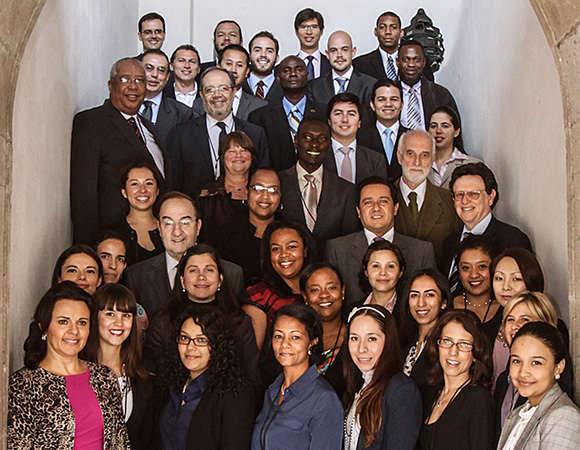Gaukhar Mukhatzhanova
September 10, 2014
On July 7-11, 2014, 32 diplomats from 22 countries of Latin America and the Caribbean participated in the first regional course on nuclear disarmament and nonproliferation in Mexico City. This summer school was organized by the Ministry of Foreign Affairs of Mexico and CNS, in cooperation with the Diplomatic Academy of Mexico (Instituto Matias Romero) and the Organization for the Prohibition of Nuclear Weapons in Latin America and the Caribbean (OPANAL).

Participants and organizers of the regional nuclear disarmament and nonproliferation course. (Source: Ministry of Foreign Affairs of Mexico)
“Very Comprehensive Background”
The course program covered the basics of nuclear fuel cycle and weapons, the history of nuclear weapons programs and strategies, the evolution of arms control and nonproliferation efforts, the Nuclear Non-Proliferation Treaty regime, International Atomic Energy Agency (IAEA) safeguards, recent nuclear disarmament initiatives, including the humanitarian dimension, and other topics. Lecturers at the course included some of the leading international experts and representatives of regional and international organizations. Speakers from Latin America provided regional perspectives on issues such as nuclear-weapon-free zones, verification, and export controls. Summer school participants engaged in discussions with speakers and group exercises on the nuclear test ban and disarmament topics. They also had a chance to visit foreign ministry’s archives and the Treaties Vault, where they saw the original signed copy of the Treaty of Tlatelolco that established a nuclear-weapon-free zone in Latin America.
In their evaluations and feedback, the majority of course participants rated it as “excellent and “very useful.” Some of them further noted that the course gave them a “very comprehensive background,” “was a very good opportunity to acquire more knowledge on nuclear disarmament,” and “was very interesting because of the diversity of perspectives.” The participants also provided constructive suggestions for the future regional courses.
CNS and the Mexican Ministry of Foreign Affairs plan to continue their cooperation and organize, together with other partners, another regional summer school on nuclear issues next year.
Download the course program and visit the course webpage (in Spanish).
